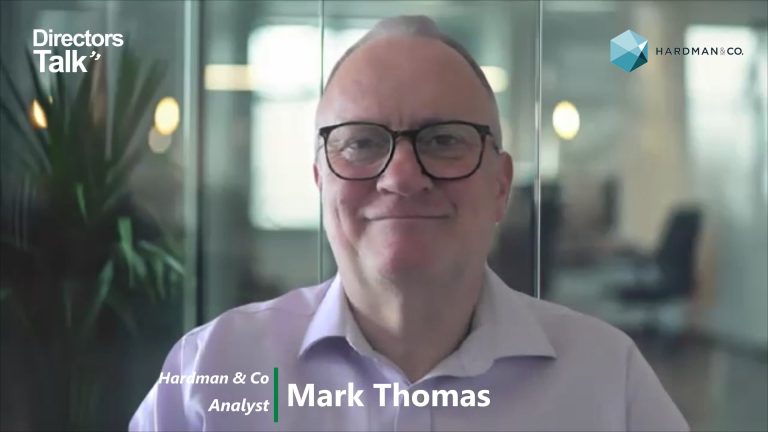Hardman & Co Analyst Mark Thomas caught up with DirectorsTalk for an exclusive interview to discuss Morses Club PLC (LON:MCL)
Q1: Now Mark, Morses Club, a home collect credit company, what is so attractive about this market that it’s in?
A1: Well, we believe the home credit collect market offers excellent risk reward opportunities for investors, the key issues are two-fold; there’s real sustainable demand for the product and secondly there are barriers which prevent large mainstream lenders attacking it.
Taking the demand first, customers who were unable to access mainstream lending have a convenient product at a fair price which is well below most of the alternative available financing source, they like it, with independent surveys showing 95-97% are either satisfied or very satisfied with the product. The agent relationship is key to this service and these satisfaction levels, it embeds Morses Club PLC in the community and it is essential to the effective management of credit, it cannot be replicated by the computer systems used by mainstream companies. Statistical models tell you the ability of the customer to repay but it’s an experienced agent that tells you whether they’re willing to do so, the borrowers are on variable incomes, do several jobs, very tight budgets and it’s the agents that knows whether the £5 or £10 a week they have left over each week will be used to repay debt. The agent will also know the local factory is doing well or if it’s laying off staff and a model thousands of miles away simply cannot do that, the agent is a key barrier to entry which means that the good returns which are currently being earned are sustainable ones.
Q2: Given the high interest rates, won’t the regulator intervene sooner rather than later and impose price caps?
A2: The price may appear high, certainly relative to mainstream products, but what you have to bear in mind is it’s appropriate to the high costs of delivering a face-to-face service model and also the credit experience of this business where, roughly speaking, 25% of revenue would be lost in terms of credit losses. Now, arrears are managed very carefully with controlled forbearance, they’re not done by imposing penalties, the customer’s ability and willingness to repay are fundamental to the lending decision, the agent can know the customer a zillion times better than any computer-driven model can and you cannot ignore the fact that the customer likes the product.
At the end of the day, all of these features are recognised by the regulator, it’s a reasonable price, the customers like it and it’s a customer that’s very well-known. All the previous reviews of home collect credit have not resulted in any material business change or any material adverse profit impact, there have been small operational changes but they’re relatively minor. Morse Club PLC’s business is not a payday lender, its interest rates are about half the cap the FCA imposed on that business, it’s not exposed to any further remedies to payday lending market, the November 2016 FCA review is much more targeted at the rent-to-buy market where customer affordability is very poor, the customers are barely known, you’re not embedded in the community. In some ways, home collectors are more of a solution than a problem.
Q3: But isn’t the business terribly high-risk, won’t a recession or the later stages of austerity hitting benefits mean credit losses will rocket?
A3: Taking on the recession point first, when you get economic distress the number of customers who drop out of prime status goes up, massively increasing the potential pool of customers that Morse Club can address. Secondly, Morses Club can reprice, it’s much easier to add 20% to a loan with an APR of 200/300/400% than it is to actually add 1% to a mortgage where you might be charging 3-4%, funding costs will rise but the bottom line is incredibly resilient because you’ve got more customers and you can reprice, if you look at Provident Financial’s profits, they actually rose from 207-2009 and how many lenders can actually say that.
Looking at austerity you have to recognise the vast majority of customers’ income actually comes from jobs, not benefits, the jobs may not be 9-5, the income maybe variable but the business is not about lending to people and taking their benefits.
Q4: Is home collect going to show any growth, do you think?
A4: The overall market volume has been broadly stable and low single digit growth is what we expect to continue, Morses Club can grow much faster than that though. Firstly, it’s using technology to improve its efficiency, it delivered a 7% productivity improvement in the first half, it’s improved revenue, its tightly controlled credit and looking outside its own business, Morses Club has been expanding by attracting experienced agents from competitors, acquiring books of customers where mature owners with small businesses simply can’t work in the current regulatory world. It’s used technology to attract new customers via things like the web, it’s introducing new products in related areas where it has a competitive advantage, it already has the contact centre, the credit tools, the customer web flow, product sweeps to address online lending and the potential there is huge. The nature of the company is very conservative, we expect slow considered growth from these new product areas but Morses Club can grow much faster than the market.
Q5: Now, looking at your notes, they spend a lot of time on accounting, why is that?
A5: It’s unfortunate that we need to get a bit nerdy here but home collect as a market, so this is all the players in home collect, it’s a very small part of the overall lending market and accounting rules that are reasonable for the mainstream actually create major distortions. The biggest single one arises on discounting cash flows using the customer interest rate which we believe massively understates the value of a company like Morses Club PLC.
In our note, we give an example of a loan of £100, now quite sensibly that is initially valued at £100, it’s what you would expect, where the customer misses two payments and a lot of home collect customers do that but they still fully repay, the accounting rules say you must value the loan on expected cash flows discounted to a present value using the customer interest rate. Now, with modest discount rates that’s perfectly reasonable but the interest rate in home collect reflect the higher service cost and the high credit experience in that market, using the interest rate driven by those factors means that that discounting factor is way too high, a £100 loan would actually get discounted to £46.80 even though the expected losses would be just £16.25. Now, valuing the loan at £46.80 reduce equity, it could actually run into tens of millions of pounds compared to the value of the company’s equity, by way of illustration, if I discounted the same cash flow at 25% a reasonable return on equity the NPV would actually go up, not down.












































